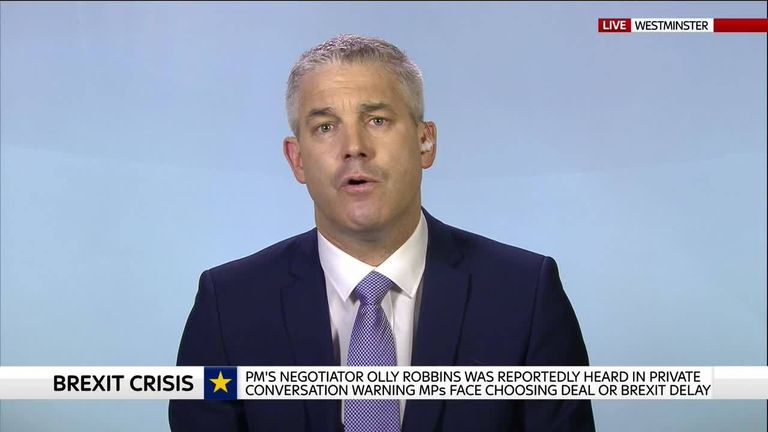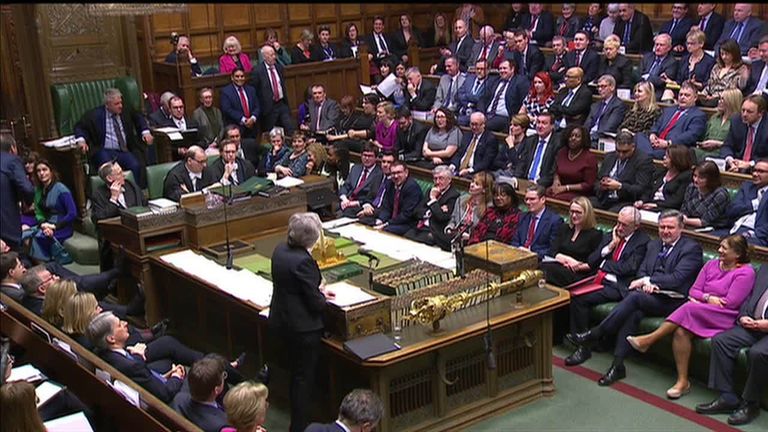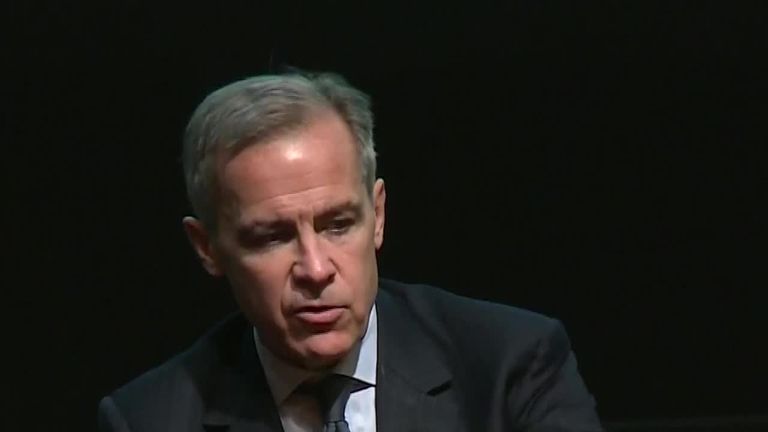Delaying Brexit would send 'very odd message' to voters, says Brexit Secretary Stephen Barclay
The Brexit secretary distances the government from suggestions MPs could be faced with a "long" delay unless they back a deal.
Wednesday 13 February 2019 12:24, UK
The Brexit secretary has distanced the government from suggestions MPs could be faced with a delay to Britain's EU exit unless they back Theresa May's deal.
Stephen Barclay told Sky News it would send a "very odd message" to UK voters.
He was responding to a report that Olly Robbins, the prime minister's chief EU negotiator, was overheard in a Brussels bar saying the bloc would probably grant an extension to Article 50.
This would lengthen the period for the UK to negotiate a withdrawal agreement and delay Britain's departure from the EU, currently scheduled for 29 March.
Mr Robbins, a top civil servant, was said to have indicated that if MPs did not back a Brexit deal, then the delay would be "a long one".
"The issue is whether Brussels is clear on the terms of extension. In the end they will probably just give us an extension," Mr Robbins was quoted as saying.
"Got to make them believe that the week beginning end of March... Extension is possible but if they don't vote for the deal then the extension is a long one."
However, when asked about the prospect of delaying Brexit, Mr Barclay told Sky News: "It would be very difficult because you have the European parliamentary elections at the end of May.
"I think it would be a very odd message to say to the British public three years after they voted to leave, they should consider voting for members of the European Parliament.
"I think that would go back on what many people voted for."
The Brexit secretary, who met EU chief Brexit negotiator Michel Barnier alongside Mr Robbins earlier this week, added that the EU would not necessarily agree to an extension.
"What European leaders were clear in saying to me is that they don't see any merit in extending the uncertainty and merely prolonging that," he added.
Responding to the ITV report about Mr Robbins' alleged comments, a government spokesperson said: "MPs voted to trigger Article 50 and have passed legislation stating we will leave on 29 March.
"We want to leave with a deal and we are working hard to deliver that but the factual position - as determined by parliament - is that, either way, we leave on 29 March."
Mrs May told MPs on Tuesday that she needed "some time" to get changes to the Irish border backstop - the key barrier to the PM getting a deal approved by parliament.
The backstop is an insurance policy designed to avoid a hard border on the island of Ireland in the event that Britain and the EU cannot agree a free trade deal in time.
Mrs May denied suggestions she was "running down the clock" on Brexit, as Labour leader Jeremy Corbyn accused her of "blackmailing" MPs into supporting a "deeply flawed deal".
Meanwhile, the PM is facing further Brexit pressure from parliament, with MPs revealing two new plans to try and stop a no-deal divorce.
Mr Corbyn is leading the Labour frontbench bid to force a vote on the EU divorce deal itself or let MPs come up with their own plans to change the course of Brexit.
From the backbenches, Yvette Cooper has teamed up with Labour colleagues and Tory rebels to try to give MPs a separate vote a fortnight before Brexit day on 29 March.
It would force Mrs May to declare whether she will take the UK out of the EU with or without a deal, or delay Brexit.
The bid, which is supported by Conservatives Oliver Letwin, Nick Boles and Dominic Grieve, is a revised amendment following the original's defeat by 23 votes last month.
Ms Cooper had sought to delay Brexit until the end of 2019 if there was no deal in place by the end of February, but faced defeat at the hands of Labour MPs who worried about the reaction in Leave-voting constituencies.
Her new plan is likely not to be formally put to parliament until the end of February, while Mr Corbyn is expected to table his on Thursday.
MPs will get a chance to vote on Mrs May's Brexit progress that day, but she has sought to head off a Tory rebellion by telling her backbenchers to "hold our nerve" for another two weeks.







